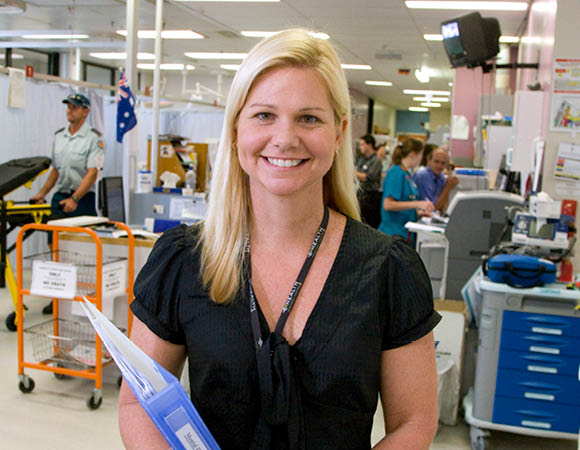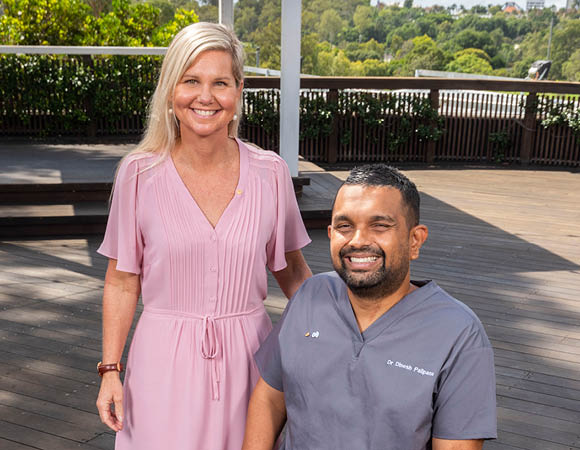Changing the world, one emergency at a time
Doctor of Philosophy, Master of Emergency Nursing (Honours) and Bachelor of Nursing
Professor Julia Crilly OAM always had a desire to help others and make the world that little bit better, so when she was a youngster at school looking for a career, nursing seemed the perfect fit.
She couldn’t have imagined that her time in the Emergency Department would lead to a successful career in healthcare research that would change the way emergency healthcare is delivered to vulnerable people in society.
Education opened doors
During her ten years as an Emergency Department nurse, Julia thrived on the fast pace and changeable work environment. The fact that no two days were alike was a big drawcard, as well as the ability to help people when they were often at their lowest.
“When people are in Emergency, it’s often one of the worst days of their lives; being able to contribute as part of a team to provide quality care and comfort for people during such a time is a true privilege,” she said.
When she began working at the Gold Coast Hospital Emergency Department, she was encouraged to undertake postgraduate education and she eagerly took up the mantle. “Further study made sense to me,” she explained.
“Especially when you’re in a specialty area like in the Emergency Department, so I enrolled in my Masters of Emergency Nursing... and eventually my PhD.
“I’ve always been interested in learning and wanting to improve my own skills and to share that knowledge with others to improve our practices – both my parents were teachers so I guess it’s in the DNA. I really enjoyed being able to contribute, to make a meaningful impact for patients on an individual level in the Emergency Department.
"I also I wanted to contribute though to broader issues that impacted upon patients requiring emergency care – and that opportunity to contribute came through research.
“Undertaking a PhD was the match that ignited my passion to want to drive forward the emergency care research agenda locally, nationally, and internationally. It really has and continues to create so many opportunities to contribute and give back to the profession; opportunities I would not otherwise have had without it,” she said.
Supporting the vulnerable
Fast forward a number of years and Julia is working in a joint appointment between Griffith University and Gold Coast Health as a Professor of Emergency Care, leading important health care research that aims to improve care delivery for especially vulnerable people.
“I really love working in a joint appointment role. I aim to contribute to the goals of both organisations in a variety of ways. Through the research I lead and am involved with, I am able to provide opportunities for clinicians and academics to come together to work on projects of mutual importance, which is very rewarding for all involved,” she said.
Julia says when she started in healthcare research she was one of two nurse researchers responsible for establishing and building research capacity in South East Queensland Emergency Departments. Things have certainly progressed since then and now the research being undertaken is prolific, having great social impact.
“The research I lead is focused on two main streams, the first is around vulnerable populations and emergency care delivery models for those groups,” she said.
“By vulnerable populations I mean older people, people who present with mental health problems, people who are brought in by police.”
The second stream of Julia’s research is around stress and coping of emergency staff.
“The Emergency Department is an extremely stressful place to work, so understanding what staff find stressful and how they cope enables us to then plan for, develop, test, and evaluate strategies designed to assist them,” she explained.
“It’s important that we look after the staff who look after us.”
One of the things Julia really enjoys within her role is the opportunity to work with other organizations that intersect with the Emergency Department. Once such research project involved working with health, police, ambulance and a number of universities regarding healthcare delivery for people detained in the police watch house.
"This projects involved trialing a model of care that saw emergency department nurses work in one of the police watch houses. The ED nurses complimented the community nurses, which meant that there was a 24/7 nursing presence in the watch house.
"The nurses would work within a team; they communicated with the detainees, the forensic medical officer, paramedics, other health workers, ED staff and police to optimize care delivery for this especially vulnerable population.
“We found that it was a safe and effective model of care, and that it helped reduce the number of transfers to the emergency department. That project provided the platform to progress on to some multi-site research that is being undertaken now where we aim to understand how healthcare is delivered in other watch houses.
"Then we will be in a position to do some interventional research, hopefully trialing one or several healthcare delivery models in different watch houses and Emergency Departments in Queensland and hopefully Australia.”
Julia says she gets a real thrill from being able to help understand and improve emergency care on such a large scale.
“I find the work I do very rewarding work; it helps address priority areas that impact not only the ED and community where I work, but hopefully other EDs and communities around the world,” she said.
“I think it aligns really well with Griffith’s mission to make a meaningful contributions to society and produce ground-breaking research.”
Crowning achievements
It’s not only those in healthcare who are recognising Julia’s work; she was awarded a Medal of the Order of Australia in 2020 for her contribution to emergency care nursing.
“I was truly humbled and honoured to receive that award,” Julia said.
“I see it as a reflection of the outstanding people I have and continue to have the opportunity to work with from so many sectors.”
She says that her time at Griffith has been instrumental in helping her reach her career goals.
“I have been so fortunate to have great mentors and colleagues here at Griffith who have given helpful career and personal advice that’s all helped along the way.
“I have appreciated and benefited from the caring and personalized approach that Griffith, and the people that make Griffith what it is, have provided... The University has grown so much in so many ways since I began studying there. I am where I am, in my joint appointment, largely because the support of people who gave great advice and were great role models and leaders for me to look up to.
“To be part of Griffith’s growth has been a really wonderful opportunity.”


